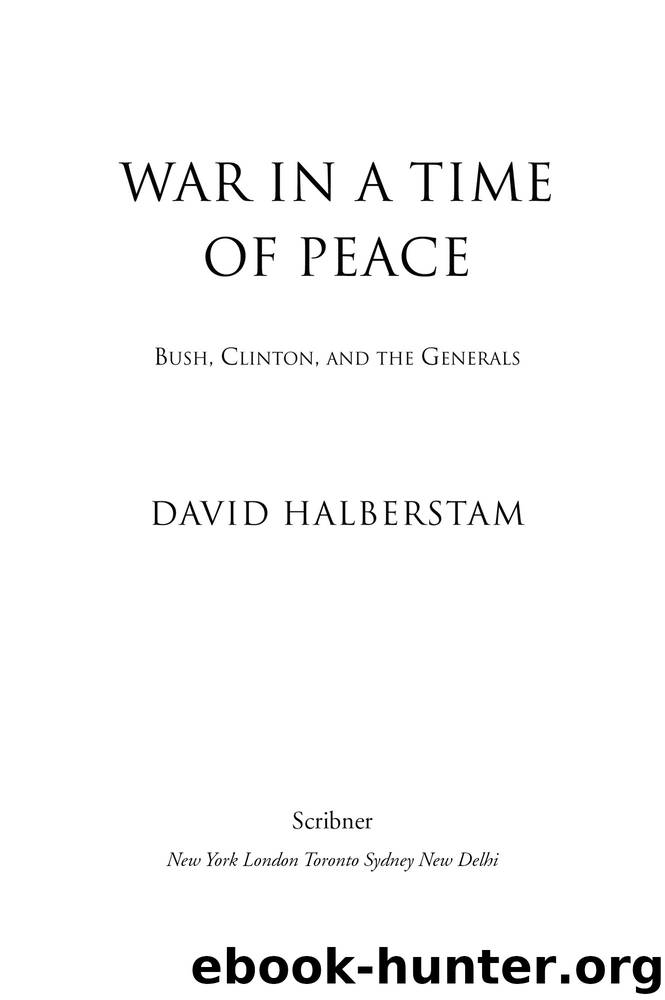War in a Time of Peace by David Halberstam

Author:David Halberstam
Language: eng
Format: epub
Publisher: Scribner
CHAPTER TWENTY-FIVE
Nineteen ninety-four had not been a good year for Clinton and his advisers. The problem of Bosnia remained outside their reach, limiting everything else they did in foreign affairs. One extraordinary media moment had highlighted the administration’s frustration as if to remind them that, monopoly superpower or not, our rhetoric was mightier, if not than our sword, then certainly our deeds and will. In the spring of 1994, Christiane Amanpour appeared on a special CNN program and got a rare chance for a correspondent in a war zone to ask the president a question. That network was showcasing its new technological abilities by holding an international town hall meeting featuring Bill Clinton as the principal guest. The occasion was supposed to be ceremonial, and the White House assumed this was a good deed, a favor to CNN, and that Clinton would be asked slow-pitch, softball questions rather than the tough and gritty questions its correspondents normally asked. But when they cut to Amanpour in Sarajevo, she, the correspondent based in what was a living hell, reacted with the obsession that went with the territory. She asked the president why it was taking him so long to come up with a policy on Bosnia. Didn’t he think, she added, “that the constant flip-flops of your administration on the issue of Bosnia set a very dangerous precedent?”
Bingo: she had nailed him, live and in color and in front of the entire world. Clinton was not pleased, not expecting this kind of question. He was obviously angry—his face grew hard and his voice icy. “There have been no constant flip-flops, madam,” he said. But of course there had been, and well into their second year in office, the Clinton people were still searching for a policy.
With the administration effectively stalemated, the tensions showed on Tony Lake more than anyone else on the NSC team. Christopher was seeking his own measure of distance from the issue, and Sandy Berger, Lake’s deputy, was a pragmatist who, more than anything else, reflected Clinton’s politics. But these were Lake’s issues. He, after all, was the one committed to a new and more active policy in the Balkans, and he had become the most anguished as events remained outside their control. Lake sometimes thought that he and his colleagues in the administration had become what they had all campaigned against two years earlier. But he was caught between his personal beliefs on Bosnia and his loyalty to the president. From the spring of 1994, well into the spring of 1995, with the Serbs behaving even more aggressively in Bosnia, his frustration steadily mounted.
Issues like this, rather than the strategic Cold War struggle between the world’s great powers, were what had driven him for more than two decades. For that reason, Lake’s primary interest, even before the collapse of the Soviet Union, separated him from most contemporary national security figures. Despite all the ongoing tensions, he believed our conflict with the Soviets had effectively been settled in a
Download
This site does not store any files on its server. We only index and link to content provided by other sites. Please contact the content providers to delete copyright contents if any and email us, we'll remove relevant links or contents immediately.
| Elections & Political Process | Ideologies & Doctrines |
| International & World Politics | Political Science |
| Public Affairs & Policy | Specific Topics |
| United States |
The Secret History by Donna Tartt(19025)
The Social Justice Warrior Handbook by Lisa De Pasquale(12182)
Thirteen Reasons Why by Jay Asher(8883)
This Is How You Lose Her by Junot Diaz(6869)
Weapons of Math Destruction by Cathy O'Neil(6260)
Zero to One by Peter Thiel(5782)
Beartown by Fredrik Backman(5733)
The Myth of the Strong Leader by Archie Brown(5491)
The Fire Next Time by James Baldwin(5422)
How Democracies Die by Steven Levitsky & Daniel Ziblatt(5210)
Promise Me, Dad by Joe Biden(5139)
Stone's Rules by Roger Stone(5078)
A Higher Loyalty: Truth, Lies, and Leadership by James Comey(4946)
100 Deadly Skills by Clint Emerson(4911)
Rise and Kill First by Ronen Bergman(4775)
Secrecy World by Jake Bernstein(4737)
The David Icke Guide to the Global Conspiracy (and how to end it) by David Icke(4696)
The Farm by Tom Rob Smith(4500)
The Doomsday Machine by Daniel Ellsberg(4480)
